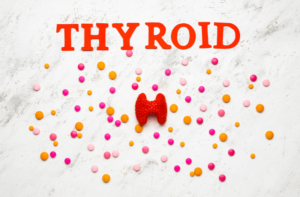Section 7a: Endocrine – Hyperthyroid

Anatomy and Physiology
The thyroid gland, a butterfly-shaped organ located in the neck, is a key component of the endocrine system. It produces hormones, primarily thyroxine (T4) and triiodothyronine (T3), that plays a role in regulating metabolism. The release of these hormones is controlled by the thyroid-stimulating hormone (TSH) produced by the pituitary gland.
Importance to Overall Health
A well-functioning thyroid is essential for maintaining overall health, as thyroid hormones influence metabolism, energy production, and the functioning of various organs. An overactive thyroid, known as hyperthyroidism, accelerates metabolic processes, leading to increased heart rate, weight loss, and heightened sensitivity to heat. Recognizing and addressing hyperthyroidism is crucial for preventing long-term complications and maintaining hormonal balance.
Dysfunction
Hyperthyroidism can result from conditions such as Graves’ disease, thyroiditis, or nodules on the thyroid gland. Symptoms may include rapid heart rate, weight loss, anxiety, and heat intolerance. Untreated hyperthyroidism can lead to serious complications, including heart issues and bone loss.
Nutritional Component
The nutritional biochemistry of the hyperthyroid endocrine system involves the regulation of thyroid hormones, primarily thyroxine (T4) and triiodothyronine (T3). These hormones play a crucial role in metabolism, energy production, and overall cellular function.
- Iodine Utilization: Iodine is a key component in the synthesis of thyroid hormones. The thyroid gland takes up iodine from the bloodstream and incorporates it into the structure of T3 and T4.
- Thyroid Hormone Synthesis: Thyroid hormones are produced through a series of enzymatic reactions in the thyroid follicular cells. Tyrosine, an amino acid obtained from dietary protein, is crucial for this process.
- Conversion of T4 to T3: While T4 is the primary hormone produced by the thyroid, it needs to be converted to the more active T3 form in peripheral tissues. This conversion involves enzymatic processes influenced by nutritional factors.
Science Behind Nutritional Influence
Nutrients and dietary choices significantly impact the nutritional biochemistry of the hyperthyroid endocrine system:
- Selenium: Essential for thyroid function, selenium plays a role in the conversion of T4 to T3. Sources include Brazil nuts and seafood.
- Iodine: While critical for thyroid hormone synthesis, excess iodine intake should be avoided. Iodine-rich foods include seaweed, dairy, and fish.
- Zinc: Supports thyroid function and helps convert thyroid hormones. Dietary sources include meat, seeds, and nuts.
- Vitamin D: Plays a role in immune function and may be beneficial for individuals with autoimmune thyroid conditions. Sunlight exposure and fortified foods are sources of vitamin D.
Supplements
Explore the potential benefits of glandular supplements tailored to your individual health profile by setting up a free 10 minute call with Dr. Kneessi. Otherwise here are some of the most common supplement recommendations for supporting this system. The above 4 nutrients are also the 4 most recommended supplements.
- Selenium: Essential for thyroid function and may help regulate thyroid hormone production.
- Iodine: Important for the synthesis of thyroid hormones, but supplementation should be approached with caution and under guidance.
- Zinc: Supports thyroid function and helps convert thyroid hormones.
- Vitamin D: Plays a role in immune function and may be beneficial for individuals with autoimmune thyroid conditions.
- Ashwagandha: An adaptogenic herb that may help modulate thyroid function and reduce stress.
These supplements are selected to provide support for individuals with an overactive thyroid. It’s important to consult with a healthcare professional, especially for those with thyroid disorders or taking medications, to ensure the supplements are suitable for individual health needs and do not interfere with prescribed treatments.




